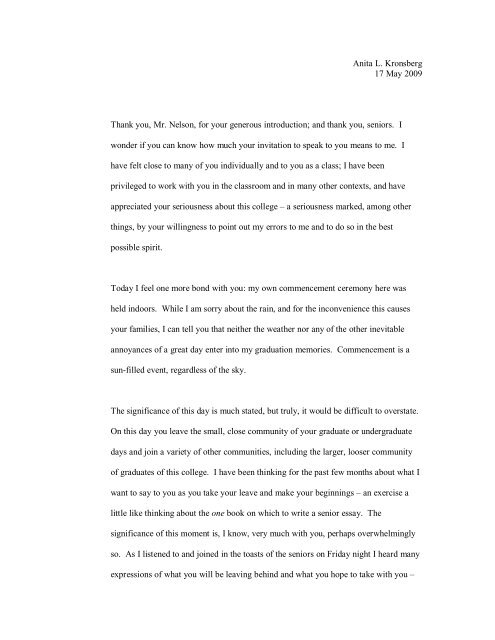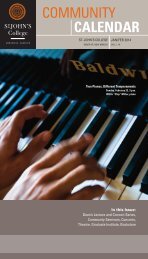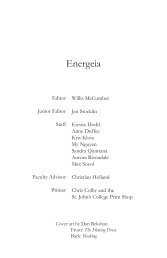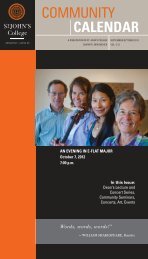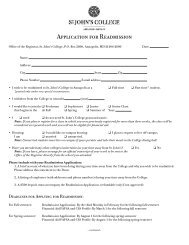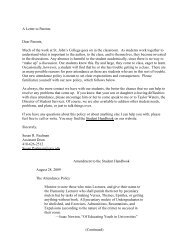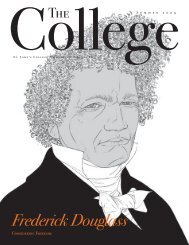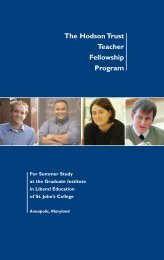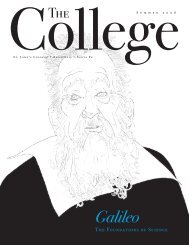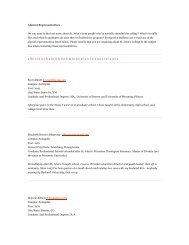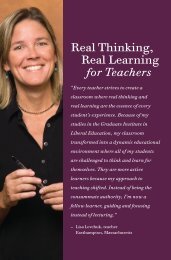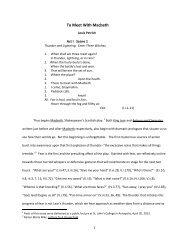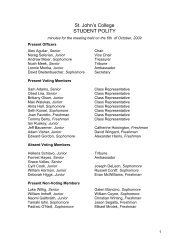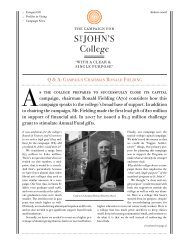Read the Commencement address - St. John's College
Read the Commencement address - St. John's College
Read the Commencement address - St. John's College
Create successful ePaper yourself
Turn your PDF publications into a flip-book with our unique Google optimized e-Paper software.
Anita L. Kronsberg<br />
17 May 2009<br />
Thank you, Mr. Nelson, for your generous introduction; and thank you, seniors. I<br />
wonder if you can know how much your invitation to speak to you means to me. I<br />
have felt close to many of you individually and to you as a class; I have been<br />
privileged to work with you in <strong>the</strong> classroom and in many o<strong>the</strong>r contexts, and have<br />
appreciated your seriousness about this college – a seriousness marked, among o<strong>the</strong>r<br />
things, by your willingness to point out my errors to me and to do so in <strong>the</strong> best<br />
possible spirit.<br />
Today I feel one more bond with you: my own commencement ceremony here was<br />
held indoors. While I am sorry about <strong>the</strong> rain, and for <strong>the</strong> inconvenience this causes<br />
your families, I can tell you that nei<strong>the</strong>r <strong>the</strong> wea<strong>the</strong>r nor any of <strong>the</strong> o<strong>the</strong>r inevitable<br />
annoyances of a great day enter into my graduation memories. <strong>Commencement</strong> is a<br />
sun-filled event, regardless of <strong>the</strong> sky.<br />
The significance of this day is much stated, but truly, it would be difficult to overstate.<br />
On this day you leave <strong>the</strong> small, close community of your graduate or undergraduate<br />
days and join a variety of o<strong>the</strong>r communities, including <strong>the</strong> larger, looser community<br />
of graduates of this college. I have been thinking for <strong>the</strong> past few months about what I<br />
want to say to you as you take your leave and make your beginnings – an exercise a<br />
little like thinking about <strong>the</strong> one book on which to write a senior essay. The<br />
significance of this moment is, I know, very much with you, perhaps overwhelmingly<br />
so. As I listened to and joined in <strong>the</strong> toasts of <strong>the</strong> seniors on Friday night I heard many<br />
expressions of what you will be leaving behind and what you hope to take with you –
May 2009.doc<br />
Draft V<br />
<strong>the</strong> focus, indeed, of this and many o<strong>the</strong>r commencement <strong>address</strong>es. Among <strong>the</strong> things<br />
toasted were courage and strangeness, <strong>the</strong> very topics which had eventually emerged as<br />
central to what I will say this morning. I found that reassuring.<br />
We ask a lot of our students here. In your first semester at <strong>St</strong>. John’s, <strong>the</strong>re were no<br />
introductory courses: you read Homer himself, Euclid, Plato, Thucydides, and Aristotle<br />
<strong>the</strong>mselves. (Mollin and Williamson <strong>the</strong>mselves.) Think back to your first seminar.<br />
For all undergraduates, <strong>the</strong> reading is Homer, but <strong>the</strong> experience of <strong>the</strong> first seminar<br />
tends to be much <strong>the</strong> same, whatever <strong>the</strong> reading. After about two hours of a heated,<br />
clamorous, sometimes vainglorious experience we called “conversation,” you had<br />
dispatched <strong>the</strong> first six books of <strong>the</strong> Iliad. You had probably never so much as seen a<br />
trireme or a greave; if you had, you learned that it was not relevant to <strong>the</strong> discussion.<br />
After three more such conversations, <strong>the</strong> Iliad was behind you, and you marched forth<br />
through <strong>the</strong> Odyssey, <strong>the</strong> Oresteia, and a succession of dialogues, histories, plays, and<br />
treatises both physical and metaphysical. This was just in seminar. Things move fast,<br />
and students quickly begin to collect a list of small failings that plague <strong>the</strong>m through<br />
<strong>the</strong>ir years here, a bit like <strong>the</strong> chain that Jacob Marley forged in life. Perhaps, in that<br />
first reading, you did not quite finish <strong>the</strong> latterly significant catalogue of ships. Can<br />
you give a clear and distinct account of compound ratio? Of <strong>the</strong> circumstantial use of<br />
<strong>the</strong> Greek participle? Of <strong>the</strong> proofs of <strong>the</strong> existence of God or of <strong>the</strong> antinomies of<br />
reason? Of relativistic time dilation? I hope you have been able to answer “no” to at<br />
least one of <strong>the</strong>se questions.<br />
This morning, however, I would like to urge you to attend to some things that you have<br />
diligent about, often without noticing, since you commenced your work here. No<br />
2<br />
Anita L. Kronsberg<br />
17 May 2009
May 2009.doc<br />
Draft V<br />
single book, <strong>the</strong>orem, or paradigm of semesters past is essential to living <strong>the</strong> life that<br />
<strong>the</strong> founders of this program of study hoped to encourage in its students. What is<br />
essential is a disposition to discover and to live that life, to inquire into and pursue<br />
what is good, what is right, what is beautiful -- and this disposition you have cultivated<br />
in your time here. I confess I have in mind not one, but an ill-defined cluster, or<br />
perhaps swarm, of dispositions. I will point to one or two, primarily through reflecting<br />
on <strong>the</strong> courage that is required to cultivate <strong>the</strong>m. You have participated in a course of<br />
study at a college with an academic program and practices that are distinctive in a<br />
number of ways.<br />
One distinction, for which we are ei<strong>the</strong>r famous or infamous, is <strong>the</strong> fact that <strong>the</strong> authors<br />
of <strong>the</strong> works we study are all dead. Whe<strong>the</strong>r this is essential or accidental is open to<br />
question. Ano<strong>the</strong>r distinctive feature of <strong>the</strong> <strong>College</strong> is absolutely essential: we learn<br />
here in and through conversation with our companions and guides in this land of <strong>the</strong><br />
dead, who are our living classmates and colleagues. Courage is a virtue you have<br />
practiced by necessity here as you pursued a course of study requiring you to learn<br />
both from <strong>the</strong> living and from <strong>the</strong> dead.<br />
Without discussion of <strong>the</strong> kinds or parts of courage, it is safe to say that you are more<br />
courageous now than you were when you matriculated. If virtue is cultivated by<br />
practice, this must of necessity be true. Embarking on <strong>the</strong> program of study here<br />
requires both audacity and humility. It takes audacity to think that it will be fun to<br />
tackle in two or four years this list of books, any one of which can support a lifetime of<br />
study. It takes humility to submit yourself to each book in turn with a readiness to<br />
3<br />
Anita L. Kronsberg<br />
17 May 2009
May 2009.doc<br />
Draft V<br />
learn from it. Audacity may be sufficient for embarkation, but it will not carry you far;<br />
along <strong>the</strong> way, informed by humility, you must acquire some courage.<br />
Perhaps <strong>the</strong> most consistent way in which your courage has been called upon has been<br />
<strong>the</strong> ceaseless demand to examine, revise, and at times abandon your opinions. We talk<br />
so frequently about examining our opinions and preconceptions that we can forget how<br />
truly difficult this is. None<strong>the</strong>less it is this practice, more than any particular<br />
discipline, that is at <strong>the</strong> center of what is liberal and liberating in this endeavor.<br />
Unexamined opinions enslave human thought and <strong>the</strong> human spirit, and at this college<br />
we have woven traditions and practices into our daily life that help us protect<br />
ourselves against this real evil. A tradition observed with vitality conveys <strong>the</strong> germ of<br />
an institution from <strong>the</strong> hands of one generation to those of ano<strong>the</strong>r. We have, for<br />
example, a tradition of requiring anyone who lectures here to engage in a question<br />
period (it appears from this tradition that a commencement <strong>address</strong> is not a lecture).<br />
While it would not do us any harm to allow <strong>the</strong> occasional guest lecturer to escape<br />
unsca<strong>the</strong>d by our questions, if we were to allow ourselves to deliver up our opinions to<br />
one ano<strong>the</strong>r without expecting that those opinions will be examined thoroughly, we<br />
would eviscerate <strong>the</strong> <strong>College</strong>. The tradition of question periods is one vital reminder of<br />
this.<br />
Most of <strong>the</strong> time we subject our opinions to this scrutiny with real enjoyment. That is<br />
ano<strong>the</strong>r measure of <strong>the</strong> vitality of <strong>the</strong> <strong>College</strong> and its traditions. I am sorry to say that<br />
no permanent shield from attachment to old opinions can be conferred upon you with<br />
your degree. There is a proclivity in most of us to love our opinions from which<br />
lifelong vigilance is <strong>the</strong> only protection. What is good is difficult, and questioning <strong>the</strong><br />
4<br />
Anita L. Kronsberg<br />
17 May 2009
May 2009.doc<br />
Draft V<br />
opinions we cherish is among <strong>the</strong> most difficult things to do. It requires courage, and<br />
when you leave this college it will require more courage, for you will often be without<br />
communal encouragement to it. But you will carry with you a disposition to seek out<br />
this and o<strong>the</strong>r forms of what is good, and this is a resource.<br />
In addition to a disposition to consider and seek what is good, you take with you a<br />
disposition to ask what is right. That this involves courage need hardly be said; like<br />
any question worth asking, <strong>the</strong> inward examination required entails courage. In<br />
addition, <strong>the</strong> question of what is right is very often connected to a practical matter;<br />
your judgment as to what is right must frequently be <strong>the</strong> basis of action, and action,<br />
unlike opinion, cannot be revised. We can repent, recant, apologize, but we cannot<br />
undo. Nor is it comforting to reflect that it is in <strong>the</strong>se very matters that certainty is<br />
far<strong>the</strong>st from our reach, or that while we may reflect at leisure and in private on our<br />
opinions, most actions are in some degree public.<br />
You have had considerable practice in this sort of courage; <strong>the</strong> community you have<br />
been a part of insists upon it. As a student here you bore significant responsibility not<br />
only for your own learning but for that of o<strong>the</strong>rs. In a class of fifteen or twenty people<br />
each member’s decisions, small and large, have public effects. Over <strong>the</strong> course of<br />
semesters and years <strong>the</strong> sphere of <strong>the</strong>ir publicity is enlarged.<br />
You have significant experience, both within and outside <strong>the</strong> classroom, of what it is to<br />
make <strong>the</strong> best judgment you are capable of in <strong>the</strong> circumstance and to act on it,<br />
knowing that you may be wrong. Within this community <strong>the</strong> severity of high<br />
standards is tempered by a spirit of generosity. A place here is hard won but <strong>the</strong><br />
5<br />
Anita L. Kronsberg<br />
17 May 2009
May 2009.doc<br />
Draft V<br />
strength of <strong>the</strong> community is available to each of its members: Who has not benefitted<br />
from it? This strength comes in part from numbers – in this instance, from small<br />
numbers. It is easier to find one’s place and understand one’s effect in a small<br />
community and this greatly enhances <strong>the</strong> communal endeavor to common ends. There<br />
is encouragement to look into and reach for what is right. All of us live in a<br />
multiplicity of communities, over time and contemporaneously. Most of those you<br />
will join are likely to be larger than <strong>the</strong> one you leave today. Your disposition to ask<br />
what is right and act according to it will help you to discern your place in any<br />
community, and to recognize, on occasion, those in which you have no place.<br />
You have practiced courage through <strong>the</strong> constant practice of making mistakes of<br />
various kinds, both publicly and in <strong>the</strong> presence of an ever-sharper inner witness. You<br />
know that learning requires this kind of courage, which is a form of generosity. This is<br />
what Socrates is asking for when he urges Theaetetus to be gennaios -- to say what he<br />
thinks so that <strong>the</strong> question of what knowledge is can be pursued. While learning is<br />
ultimately private – no one but Meno’s young slave himself can know whe<strong>the</strong>r he is in<br />
fact learning from <strong>the</strong> questions Socrates asks him – its conditions are very often<br />
public and <strong>the</strong>refore require this generous courage.<br />
*************************<br />
I will find my way to a conclusion by returning to Homer. In <strong>the</strong> Odyssey, he tells <strong>the</strong><br />
story of Odysseus’ travels to <strong>the</strong> Land of <strong>the</strong> Dead as Odysseus himself relates it to <strong>the</strong><br />
Phaiakaian people, onto whose shores he has washed. I have called your time here a<br />
6<br />
Anita L. Kronsberg<br />
17 May 2009
May 2009.doc<br />
Draft V<br />
journey through this land, and while <strong>the</strong>re may be some strain to this comparison, <strong>the</strong><br />
differences as well as <strong>the</strong> similarities can bear a moment’s reflection.<br />
Odysseus’ sojourn with <strong>the</strong> dead is a preparatory journey; he has made several attempts<br />
to embark on his journey home from Troy after <strong>the</strong> Greek victory over that city. At his<br />
last stop, on Circe’s island, he has been told that he cannot begin that journey aright<br />
without first visiting <strong>the</strong> dead. Although most of you have paid your visit to <strong>the</strong> dead<br />
at an earlier juncture in your lives, yours, too, has been a preparatory visit.<br />
One great difference between your travels and Odysseus’ is that while Odysseus’<br />
shipmates make <strong>the</strong> journey to Persephone’s land with him, it is Odysseus alone who<br />
speaks with <strong>the</strong> shades <strong>the</strong>re. He alone conducts <strong>the</strong> elaborate ceremony of sacrifice<br />
that gives him access to <strong>the</strong> dead, and learns to make <strong>the</strong> dead speak to him by<br />
allowing <strong>the</strong>m to drink <strong>the</strong> blood of <strong>the</strong> sacrificial animals. He is alone when <strong>the</strong><br />
shades of <strong>the</strong> dead swarm around and threaten to overwhelm him with what he calls a<br />
“green fear.”<br />
You, on <strong>the</strong> o<strong>the</strong>r hand, have been in <strong>the</strong> company of your shipmates throughout your<br />
journey; while you were tested, we hope that you were not often overcome with such<br />
‘green fear’ as Odysseus describes. <strong>St</strong>ill, you encountered much that is strange in <strong>the</strong><br />
company of <strong>the</strong> dead, and much that is wonderful as you learned to make <strong>the</strong>m speak,<br />
and <strong>the</strong> strange and <strong>the</strong> wonderful awaken <strong>the</strong> spirit of inquiry and revive a tired<br />
traveler.<br />
7<br />
Anita L. Kronsberg<br />
17 May 2009
May 2009.doc<br />
Draft V<br />
Some of <strong>the</strong> strangeness you have encountered is more or less accidental to time and<br />
place; some goes deeper. Freshmen learn how very strange those who burn <strong>the</strong>ir dead<br />
seem to those who eat <strong>the</strong>ir dead – and freshmen generally find both customs strange.<br />
It may seem or be strange that <strong>the</strong> Trojan horse-breakers were willing to endure more<br />
than ten years of siege by <strong>the</strong> strong-greaved Achaians ra<strong>the</strong>r than sacrifice <strong>the</strong> honor<br />
of a vain and petulant prince. Perhaps even stranger is <strong>the</strong> notion that Homer’s poem,<br />
and all o<strong>the</strong>r forms of imitation, might be dangerous.<br />
Some strangeness is mitigated by looking deeper, and so may be dismissed as<br />
superficial. Beneath some of <strong>the</strong> most disturbing differences we find commonalities,<br />
and we tend to think of <strong>the</strong>se as <strong>the</strong> things that matter most. The discovery of common<br />
desires and questions through <strong>the</strong> understanding of difference is part of <strong>the</strong> wonder of<br />
persuading <strong>the</strong> dead to speak. But not all surface is mere surface. Sound may be<br />
inseparable from sense, skin as revealing as skeleton; strangeness is sometimes <strong>the</strong><br />
surface of a strangeness profound. Our connections with o<strong>the</strong>r human beings bridge<br />
distance that is in some respects absolute. The dead are emblematic of this: for all our<br />
communion – our common origin, our common fate – our power to penetrate <strong>the</strong>ir<br />
world is strictly bounded.<br />
Odysseus has been instructed to make his journey in order to consult with <strong>the</strong> shade of<br />
Teiresias, <strong>the</strong> dead seer who retains his powers in <strong>the</strong> underworld and can tell him what<br />
sort of homecoming and life lie ahead for him. But he encounters many o<strong>the</strong>r shades<br />
as well. The first is that of Elpenor, a companion who fell to his death only recently<br />
after drinking a vast quantity of wine. Ano<strong>the</strong>r is <strong>the</strong> shade of Antiklea, his mo<strong>the</strong>r.<br />
Odysseus only learns that his mo<strong>the</strong>r is dead when he sees her shade among <strong>the</strong> o<strong>the</strong>rs.<br />
8<br />
Anita L. Kronsberg<br />
17 May 2009
May 2009.doc<br />
Draft V<br />
When she speaks she tells him that she died from grief over his absence, and he learns<br />
<strong>the</strong>n that <strong>the</strong> living can nei<strong>the</strong>r touch nor be touched by <strong>the</strong> dead: he cannot embrace<br />
his mo<strong>the</strong>r’s shade. After hearing <strong>the</strong> prophecy of Teiresias and speaking with his<br />
mo<strong>the</strong>r, Odysseus encounters <strong>the</strong> shades of many daughters and wives of heroes, sent<br />
to him by Persephone. At length, he interrupts his recital of <strong>the</strong> catalogue of <strong>the</strong>se<br />
shades, and says to his Phaiakaian listeners that he “could not tell over <strong>the</strong> whole<br />
number of <strong>the</strong>m nor name all / <strong>the</strong> women … / for before that <strong>the</strong> divine night would<br />
give out.”<br />
His listeners do not allow him to cut short <strong>the</strong> story, but persuade him with gifts and<br />
<strong>the</strong> promise of safe transport to expand <strong>the</strong> boundaries of its telling. Alkinoös, <strong>the</strong><br />
Phaiakaian king, declares <strong>the</strong> length of <strong>the</strong> night to be athésphatos, which means here<br />
something like, “beyond <strong>the</strong> power of a god to express.” (In an earlier context this<br />
adjective modifies <strong>the</strong> quantity of wine drunk by Elpenor before he fell from Circe’s<br />
roof.) Confronted with such powerful persuasion, Odysseus obliges <strong>the</strong>m and finishes<br />
his tale. He describes his encounters with <strong>the</strong> shades of his comrades in <strong>the</strong> war. It is a<br />
muster increasingly sad and remote: Achilles, who would be happier plowing ano<strong>the</strong>r<br />
man’s fields than ruling in Hades, speaks little, <strong>the</strong> great warrior Aias not at all. Last,<br />
<strong>the</strong> Phaiakaians hear of <strong>the</strong> mythic figures of <strong>the</strong> long dead, who suffer eternal<br />
punishments for <strong>the</strong>ir misdeeds in life.<br />
The books you have studied are <strong>the</strong> shades of <strong>the</strong>ir authors. Some are quite remote and<br />
reluctant to speak, but you have learned to discern <strong>the</strong> spark of life in many of <strong>the</strong>m<br />
and have heard <strong>the</strong>m speak. <strong>Read</strong>ing <strong>the</strong>se authors’ works, and taking seriously <strong>the</strong><br />
notion that <strong>the</strong>re is something to learn by doing so, requires, in addition to an act of<br />
9<br />
Anita L. Kronsberg<br />
17 May 2009
May 2009.doc<br />
Draft V<br />
faith, a continual shuttling between who we are and who <strong>the</strong>y are. Without a sense of<br />
who we are, we cannot know what our questions are. Without continual efforts to<br />
understand who <strong>the</strong>y are, we take away from our encounter only what we brought to it<br />
in <strong>the</strong> first place. This recasting of <strong>the</strong> ideas we encounter in our own terms is fruitless.<br />
Those we attempt to contend with in <strong>the</strong>ir terms are <strong>the</strong> ones we may persuade to<br />
speak. Although in a complete sense this is as impossible for us as it was for Odysseus<br />
to embrace <strong>the</strong> shade of his mo<strong>the</strong>r, for us, patient approach brings us nearer, and<br />
illumines <strong>the</strong> world we inhabit.<br />
The illumination and enrichment of your life through your efforts to coax <strong>the</strong> dead into<br />
a living conversation will be different for each of you. Some of you may have heard<br />
here what sort of life lies ahead for you, many of you are, just now, overwhelmed by<br />
<strong>the</strong> welter of possibilities. All of you have <strong>the</strong> disposition to enter into <strong>the</strong> experience<br />
of ano<strong>the</strong>r as far as possible while remaining <strong>the</strong> author of your own opinions.<br />
Knowing better who you are, you know what it is to have <strong>the</strong> “courage to use your own<br />
understanding.”<br />
It is a great joke here that <strong>the</strong> origin of <strong>the</strong> word school is a Greek word meaning<br />
leisure, but you will know it to be true when you leave behind <strong>the</strong> daily leisure to<br />
extend a conversation beyond <strong>the</strong> ringing of a bell. You will, however, take with you<br />
an understanding of how and when to extend <strong>the</strong> boundaries of <strong>the</strong> night, to give it<br />
length beyond <strong>the</strong> power of a god to express, when <strong>the</strong>re is a fine story to be heard or<br />
told.<br />
10<br />
Anita L. Kronsberg<br />
17 May 2009


